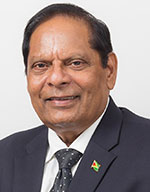FOR our indigenous peoples and other residents of the Upper Takutu-Upper Essequibo (Region Nine), the fan-out by government ministers is being celebrated as a significant grassroots exercise.
The government has taken to the people good news about a new international airport at Lethem, the region’s capital town; upgrade of the Linden-Lethem road, with paved highway initially from Linden to Mabura; asphalted roads in Lethem; possible resuscitation of the hydro-power plant at Moco-Moco, a solar farm for affordable, reliable renewable energy, etc.
The ministers on Operation Fan-out are spreading out in this vast 5,000 square miles (57,750 sq. km) region. It is over two times the size of Trinidad, and 30 times the size of Barbados. There are some 80 communities scattered in the savannahs, at the foot of hills and mountains, and around swamps and wetlands.
SOMETHING GOOD
The ministers have something good to tell and to offer the people, and would do so in some places with the assistance of translators, as our indigenous peoples speak nine languages. They have something to throw into the “tuma” pot, from which all could benefit in this pristine and beautiful Amazonian-Guiana Shield zone.
As I noted in an earlier column that was published two days after the no- confidence motion in the National Assembly, that unexpected event was an early eye-opener for the coalition. “If it has learned anything, it is that it must hit the electoral trail to console and motivate its supporters; and to energise them to re-elect the coalition with a bigger majority”, I had advised.
Upon being elected to office in 2015, the APNU+AFC coalition embarked on a revolutionary course of taking government to the people, and bringing the people to government. To his credit, Minister of State Joseph Harmon organised “out-reaches” in Georgetown, Linden, Corriverton, New Amsterdam, Linden, Lethem and on the Essequibo Coast.
We hit the road with other ministers, who listened to our people, reached out to them and gave answers to their many concerns. In Berbice, I saw an incompetent former Regional Executive Officer (REO) fretting and sweating when small contractors complained about favouritism and corrupt practices in the region. The REO resigned sometime after.
ON-THE-SPOT LOTTERIES
In Essequibo, when farmers complained that a few millers owed them for their paddy and rice, we telephoned the millers who immediately made commitments to pay up. At some locations where homeless families had been waiting for years for their house lot applications to be processed, Minister Valerie Patterson-Yearwood held on-the-spot lotteries. Many families, with a sweet mixture of joy and tears, pulled from bags, numbers for their house lots.
At complaints desks under the big tents in open spaces, our people openly and freely lodged complaints about their NIS pensions, social security benefits, firearm licences, pastures for cattle, drainage and irrigation etc. Rice farmers were ecstatic when, shortly afterwards, high-speed pumps were commissioned in major rice cultivation areas such as Canje and Black Bush Polder in the Corentyne, and at Lima and Three Friends on the Essequibo Coast.
From those initial outreaches, our government expedited the setting up of regional offices to deal with issuance of passports, birth and death certificates and, more recently, Guyana Revenue offices.
De-centralisation of public services resulted in the creation of four new towns; construction of Magistrates’ Courts at far-off places such as Lethem; the establishment of six regional radio stations in Lethem, Aishalton, Mabaruma, Bartica, Mahdia and Orealla, and expansion of internet connectivity to hinterland communities. Today, there are some 172 internet hubs at schools and government offices, many in the remote interior areas.
It was a mistake to have discontinued the ministerial outreaches, but the fact that ministers are now collectively putting boots on the ground tell the story that this coalition has not lost the common touch. We are stubbornly committed to inclusive, participatory democracy; and going into the communities is not a public relations jaunt, but a genuine move to ground with the grassroots.
FRETTING AND FUMING
Anti-government groupings, including the parliamentary opposition, are fretting and fuming over the ease with which the government continues in spite of their determined efforts to force a shut-down. They try to paint a doomsday scenario where there is no President, no Cabinet, no government. Like the unrealised Y2K prediction that the world would end by 2000, they see March 21 as the end of government in Guyana.
Beyond that, they revel in glee over a nightmare scenario of the army taking over, sanctions being imposed on Guyana, citizens’ visas being cancelled, banks being shuttered and contractors going to jail for receiving pay to do state jobs.
But no such things would happen. The government fully obeys the ruling of the court at first instance, but disagrees with its reasoning and findings. It has a right to do so, and to trigger appeal proceedings – all the way to the Caribbean Court of Justice.
In America, the Donald Trump administration has declared a National State of Emergency to access funds to build the much-vaunted and controversial border wall. What have his opponents done? They threatened to take recourse to the courts to reverse the emergency. And this is what a democracy allows.
JURISTIC HYPOTHESIS
The opposition barks against ministers of the government meeting in Plenary as if this were a breach of the order of court. However, the learned chief justice had emphasised that as at December 21, 2018, the President and the Cabinet were resigned. But in what I interpret as a juristic hypothesis, to borrow Hans Kelsen’s explanation of the grundnorm theory of pure law, the chief justice had also ruled that “the President and all Ministers of Government remain in office” for a period defined by the constitution.
The ruling does not preclude meetings of ministers “though not in the context of the Cabinet.” Cabinet could call itself a book shelf for all you know, but it would meet legally and properly as ministers, just as there are a collection of books on a shelf.
Once Cabinet does not meet as Cabinet, the President and ministers remain in office. This, the chief justice said, was agreed on by all parties in the court proceedings to ensure “the continuity of government.”
The work to prepare for elections is that of the Guyana Elections Commission which has total control and supervision over any poll. Until it says that it is ready for new elections, the President and his government remain in office and continue to do the things for which the people on May 11, 2015 voted them into office. As Guyanese would say, the opposition should relax itself.
February 17, 2019.




.png)









